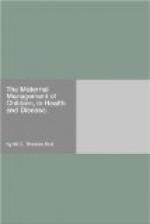The foregoing plan, and without variation, must be pursued to the sixth month.
After the sixth month to the time of weaning.—If the parent has a large supply of good and nourishing milk, and her child is healthy and evidently flourishing upon it, no change in its diet ought to be made. If otherwise, however, (and this will but too frequently be the case, even before the sixth month[FN#1],) the child may be fed twice in the course of the day, and that kind of food chosen which, after a little trial, is found to agree best.
[FN#1] See Deficiency of Milk, p. 11.
Leman’s tops and bottoms, steeped in hot water, with the addition of a little fresh milk, and sweetened or not with loaf sugar, is one of the best description.
If the stomach reject this, farinaceous food boiled in water, and mixed with a small quantity of milk, may be employed. Or weak mutton or veal broth, or beef tea, clear and free from fat, and mixed with an equal quantity of farinaceous food.
If this artificial diet is used before the sixth month, it must be given through the sucking-bottle; after this period with a spoon: in either case it must be previously passed through a sieve.
When the large or grinding teeth have appeared, the same food is still to be continued, but need not any longer be expressed through the sieve.
Such is the plan of nursing to be followed by the mother until she wean her infant altogether from the breast. The period when this ought to take place, as also the manner of accomplishing it, are detailed in the section on “Weaning."[FN#2]
[FN#2] See page 51.
The diet from weaning to the termination of infancy is pointed out under “Artificial Feeding."[FN#3]
[FN#3] See page 34.
DEFICIENCY OF MILK.
If this deficiency exist from the earliest weeks after delivery, and it is not quickly remedied by the means presently to be pointed out, a wet-nurse must be obtained. It will be of no avail partially to nurse, and partially to feed the infant at this period and under such circumstances, for if it is not soon lost, it will only live for a few months, or a year at most, and be an object of the greatest anxiety and grief to its parent. This condition arises from the unwholesomeness of the mother’s milk, united with the artificial food; for when the milk is deficient from the first, and continues so notwithstanding the means used for its increase, it is invariably unhealthy in its quality.
This deficiency, however, may exist, and even at a very early period after delivery, and yet be removed. This, however, is not to be accomplished by the means too frequently resorted to; for it is the custom with many, two or three weeks after their confinement, if the supply of nourishment for the infant is scanty, to partake largely of malt liquor for its increase. Sooner or later this will be found injurious to the constitution of the mother: but how, then, is this deficiency to be obviated? Let the nurse keep but in good health, and this point gained, the milk, both as to quantity and quality, will be as ample, nutritious, and good, as can be produced by the individual.




